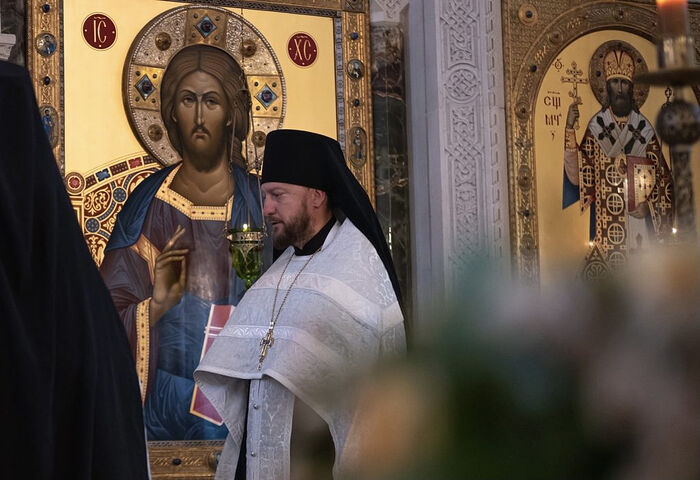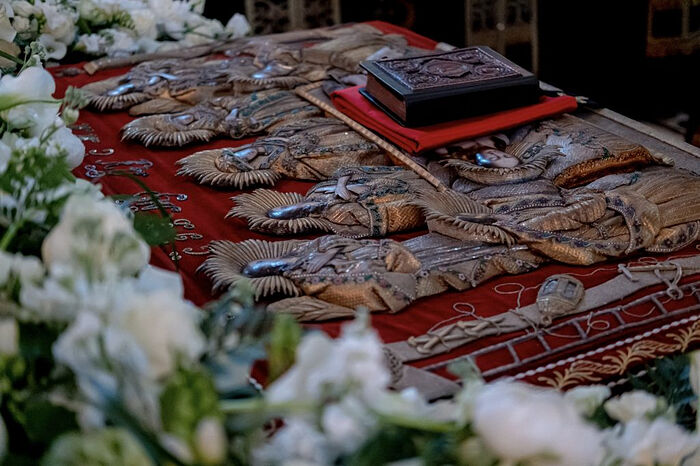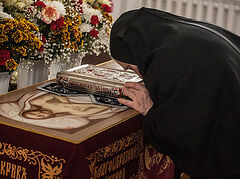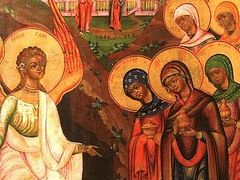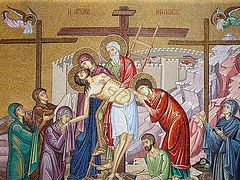In the name of the Father, and of the Son, and of the Holy Spirit!
The mournful exertions of Holy Week have partly subsided today. Peace, good faith and inspired hope in a joyful outcome are the companions of Holy and Great Saturday. We already feel the approach of Holy Pascha of Christ. Although the Holy Fire has not yet descended at the Church of the Holy Sepulcher in Jerusalem, the lights of the “icon lamps” of our hearts have already started glowing, and soon, by the grace of God, they will burn even more brightly.
Holy Saturday is one of the most mystical days in the Church calendar. The mysticism mainly lies in the mystery of the death of the Son of God, in this paradox: How did the Source of Life end up in the tomb? This mystery is resolved by the fact that God, Who became Man in order for man to become god by grace, decides to fill human death with Himself from within and transform it. For us it means that from now on human death becomes just an episode in a person’s life. Since Christ found the way out of death (after all, He rose from the dead), this means that everyone who follows Him, figuratively speaking, “clings to His robes” and will be led by Him through the “corridors of death”. And death will not be an impasse, not emptiness and suffering, but simply a door to a new blissful life. Death is banished by the onslaught of life and unites humanity to the Source of immortal Life—to God.
On this day, Christ, Whose body was lying in the tomb and Whose Spirit had descended into hell, frees its captives who had been longing for deliverance. There is a struggle between light and darkness in the underworld; at this moment light and darkness are fighting both in Jerusalem and in its vicinity: the high priests and the Pharisees are sending guards to watch the cave with the tomb of Christ, sealing its entrance and already spreading fear among the first followers of Christ.
The warfare between light and darkness also takes place in our everyday lives. Every Christian knows about the spiritual struggle, about the ups and downs on the path to blissful eternity. There is an invisible warfare between God and the devil in our hearts, as Dostoevsky put it, and only human will and freedom will declare the winner in this confrontation. A person who aims at the development (intellectual, physical or spiritual) tends to join those who surpass him. To whom then will a Christian desiring perfection cling? Is it not to Him Who is the Way, the Truth and the Life? If he does so, he will not lose even in a hopeless situation. Look at the Cross and the Shroud in the light of the Gospel narrative, and you will see that in these terrible circumstances, Christ is neither a helpless victim of human malice nor a desperate sufferer, but the Master of the situation—He Himself chose the time, the place and the form of His death, burial and Resurrection. Therefore, the last word in the struggle between life and death, good and evil, and light and darkness will always belong to Christ alone.
The most important event in the life of every Christian is what happened in Jerusalem under Pontius Pilate. The Resurrection is the essence of Christianity. What is Pascha in a nutshell? It is the way out of hell. It begins with Christ entering there, as ancient Orthodox iconography shows us, and conquering it. And it ends with people being granted the sacred opportunity to never go there again. But, before being freed from the hell of sin, we on earth should, although it may sound paradoxical, allow Christ to descend into the prisons of our souls and free the sleeping and “chained” virtues—which, of course, are there—just as He freed the righteous ones of the Old Testament. The transformation begins with the liberation from sin and the granting of creative freedom to the good that is in each one of us. Why does this require our consent? Because God has never violated and will never violate our freedom of choice. God has bound Himself with the freedom of man.
There is a well-known, remarkable phrase of unknown origin: “Christ could have been born in Bethlehem a thousand times, but it will not do you any good if He is not born in your soul at least once.” It won’t be a sin if we change it a little: “Christ could have been resurrected near Jerusalem a thousand times, but it will not be of any use to us if He is not resurrected at least once in our hearts.” Therefore, for spiritual renewal, for a new life we must already in this life become partakers in the Resurrection of Christ, letting Him rise in us and thus rising with Him.
On this day it is a custom to talk very little, and Church hymns call us to reverent silence before the mystery of the Savior’s death. And in sacred stillness we can hear and feel God Himself. So, let us now approach Christ in His Most Pure Mysteries in inner and outer silence, and afterwards, without losing our spiritual mood, let’s look forward to meeting the great and sacred Pascha. Greetings on Holy and Great Saturday and the coming feast!

